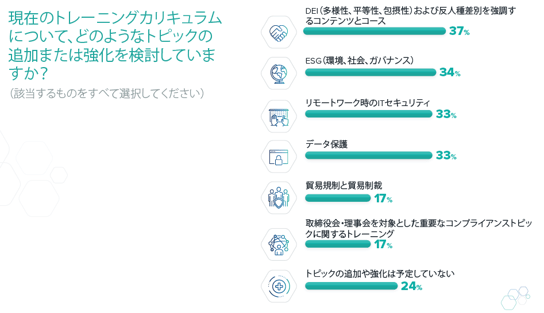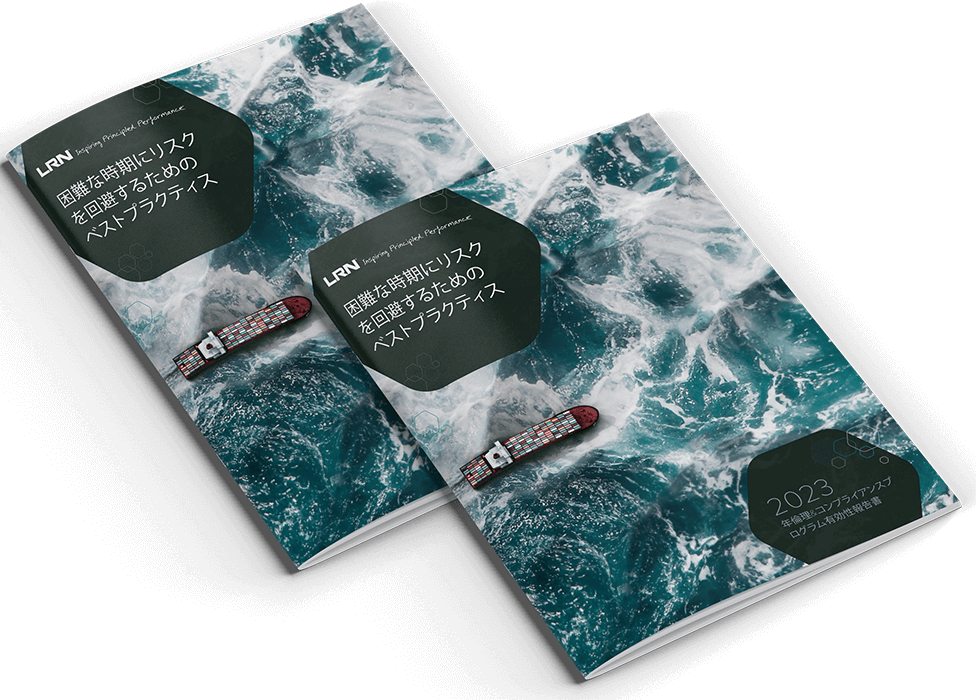First-ever insights from Japan show values take priority over written rules for "doing the right thing.”
LRN Corporation (New York, USA, CEO Kevin Michielsen, "LRN"), a leading global provider of business ethics and compliance solutions, has released its 2023 Ethics & Compliance Program Effectiveness Report, the first report with a statistically relevant sampling of Japan business ethics and compliance professionals in its 29 years. The Japanese version of the report—complete with region-specific business data—was released in May 2023, for the first time. The report is based on survey responses from approximately 1,860 ethics and compliance professionals at companies and organizations with 1,000 or more employees in 26 industries across 10 countries, making it the largest and most comprehensive survey of its kind.
In the 2023 edition, the report notes that as economic and geopolitical headwinds hang over the world, companies and organizations need to pay more attention than ever to their ethics and compliance efforts to ensure resilience and optimal business performance.
According to the research, more than half of global respondents gave their executives high marks for taking ethical considerations into account in business decision-making. More widely, a majority of respondents (84%) said their organizations relied on values, rather than rules, to motivate their employees to “do the right thing.”
Corporate ethics and compliance programs in Japan
Of the more than 1,800 responses received globally, approximately 11% of the responses related to Japanese ethics and compliance programs. Overall, Japanese programs tend to be significantly lower in effectiveness, innovation, and training best practices when compared globally, with 64% of programs rated “less effective” by LRN's own ranking index. This is significantly higher than the global average of 40%.

Factors such as internal systems in the Japanese program were identified as hindering the effectiveness and impact of the program. In addition to the need to strengthen internal systems, priorities for training improvement in the Japanese program included strengthening the training platform and enhancing custom content to address specific risks.

IT security, ESG, and data protection were mentioned as key areas for compliance training globally as a whole, while DEI (diversity, equity, and inclusion), ESG, and IT security were prioritized as training content in Japan.

“Japan is home to many of the world’s leading and best-known companies, and there is a lot of opportunity to improve ethics and compliance program effectiveness,” said Ty Francis MBE, LRN’s chief advisory officer. “It is critical that boards and C-suite leaders in Japan ensure their organizations’ E&C programs are well resourced, particularly given the emphasis by regulators around the world on personal accountability and rapidly emerging, highly complex risks.”
“Businesses around the world find themselves in the midst of a ‘perfect storm’ at the moment, including growing regulatory scrutiny, economic uncertainty, stakeholder activism, trade sanctions, and supply chain disruptions, among many other factors,” added Kevin Michielsen, CEO of LRN. “The link between fostering an ethical culture and business performance is clear, and will be increasingly critical in order to weather these challenges and navigate what will continue to be difficult terrain ahead.”
Among the other notable global findings from this year’s report include:
- Key areas of improvement to strengthen E&C programs include inadequate internal systems (76%), staff shortages (73%), budget constraints (73%) and employee disengagement (68%) are major obstacles to program effectiveness.
- Despite the war in Ukraine and enhanced/escalating sanctions on a number of countries globally, only a quarter (25%) of respondents said that they plan to enhance their trade controls and sanctions training, and just under half (45%) have strengthened risk controls in this area.
- Most respondents (60%) felt that their board of directors actively ensures that misconduct by senior executives is effectively addressed, with three-fifths of those surveyed reporting that their organization has formal requirements to take into account executives’ and employees’ ethical behavior in performance evaluations, promotion decisions, bonus awards, and hiring for key control functions.
- More than two-fifths (44%) of respondents say that their organization has disciplined or terminated the employment of a senior executive or top performer for unethical behavior in the past year, with three quarters (76%) of those respondents saying that the individual was subject to financial “claw back.”
- Increased focus on ethics and compliance is making a real difference on the ground, with more than half (52%) of respondents reporting that consideration of ethical and compliance factors and risks leads to their organization substantially modifying or even abandoning a business initiative where necessary.
- Greater use of data and metrics to assess program effectiveness was reported by more than half (52%) of respondents, but only 20% actually improved their ability to capture and understand such metrics.
The report in Japanese, 2023 Report on Ethics and Compliance Program Effectiveness, is available here. A version of this press release in Japanese was distributed on May 16, 2023.
About LRN
LRN's mission and purpose is to inspire principled performance and help people around the world do the right thing. Since 1994, LRN has worked to propel organizations forward with the partnership, knowledge, and tools to build ethical culture. More than 2,800 companies and tens of millions of learners worldwide utilize LRN services and take LRN e-learning courses to help navigate complex regulatory environments and foster ethical, responsible, and inclusive cultures. In partnership with LRN, companies translate their values into concrete corporate practices and leadership behaviors that create sustainable competitive advantage. By acting upon shared values, companies and their people find the means to outbehave and outperform.



